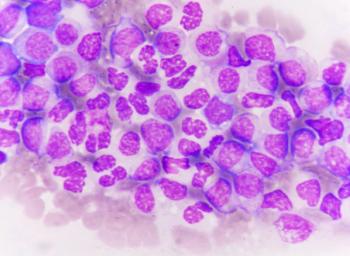
From key clinical trial updates to reports on treatment disparities, the 2026 Tandem Meetings saw several critical developments in multiple myeloma.

Your AI-Trained Oncology Knowledge Connection!


Russ Conroy is an Associate Editor for CancerNetwork. He grew up in Hillsborough, New Jersey, and graduated from Rutgers University-New Brunswick in 2022.
On the weekends, he likes to unwind by playing video games with friends, tailgating at Rutgers football games with his family, or building his music collection with a visit to Princeton Record Exchange.

From key clinical trial updates to reports on treatment disparities, the 2026 Tandem Meetings saw several critical developments in multiple myeloma.

Older age appeared to correlate with worse survival among those undergoing allogenic hematopoietic cell transplantation for acute lymphoblastic leukemia.

Prior phase 1 data support the fast track designation for pelareorep as a treatment for those with KRAS-mutated microsatellite stable colorectal cancer.

Global analysis data reveal that lung, stomach, and cervical cancers represent approximately half of preventable cancers.

Research may support the development of more comprehensive risk-stratification models accounting for different tumor-intrinsic factors.

Infusing chemoimmunotherapy earlier in the day also correlated with improvements in responses among patients with NSCLC in a phase 3 trial.

Potential FDA approval of teclistamab plus daratumumab may offer another option in the multiple myeloma armamentarium, said Surbhi Sidana, MD.

An unadjusted indirect comparison analysis of the SEQUOIA and AMPLIFY trials revealed improved PFS with zanubrutinib vs acalabrutinib plus venetoclax.

Investigators are currently assessing QTX-2101 among patients with acute promyelocytic leukemia in a phase 3 trial.

The FDA has assigned a Prescription Drug User Fee Act date of November 14, 2026, for the ivonescimab-based combination.

Approval of the larger vial size may offer more dosing flexibility for pediatric and adult patients with T-cell ALL or LBL.

A new guideline from ASCO and Ontario Health conditionally recommends the use of daratumumab for patients with high-risk smoldering multiple myeloma.

Data from the phase 3 CEPHEUS trial support the approval of the daratumumab-based regimen among patients with newly diagnosed multiple myeloma.

Investigators are currently assessing IBI3003 among patients with relapsed/refractory multiple myeloma in a phase 1/2 trial.

Data from the ENDURE trial may contextualize prior evidence suggesting an interferon-related improvement in treatment-free remission rates in CML.

Findings show that age also represents an important driver for select pathologic genomic events differing at the presentation of disease by sex.

Data from a phase 1/2 trial support the FDA’s designation for WU-CART-007 in relapsed/refractory T-cell ALL and T-cell lymphoblastic lymphoma.

Data from a phase 2 study support metabolic response on PET/CT and ctDNA clearance as potential biomarkers for predicting event-free survival.

Early safety and immunogenicity data may warrant further evaluation of iTAC-XS15-CLL01 among patients with chronic lymphocytic leukemia.

Investigators are currently evaluating zavabresib plus ruxolitinib among patients with myelofibrosis in the phase 1 PROMise study.

Throughout 2026, CancerNetwork® and the journal ONCOLOGY® will be dedicated to sharing the most critical developments in the radiation oncology field.

According to the FDA, randomized trials are preferred when assessing MRD to support accelerated approvals in multiple myeloma.

Data from the phase 2 FIRM study support the preliminary potential of firmonertinib as frontline therapy in EGFR L858R-mutated NSCLC.

Safety data from the phase 1 LUMMICAR study 1 show no high-grade CRS or any-grade ICANS among patients with myeloma who received zevorcabtagene autoleucel.

Data from the phase 2 ALTER-L043 trial may support the viability of perioperative penpulimab-based treatment in resectable non–small cell lung cancer.

Data from CARTITUDE-4 show that cilta-cel can improve outcomes for patients with lenalidomide-refractory multiple myeloma as early as first relapse.

The FDA has assigned a PDUFA date of August 30, 2026, for approving ropeginterferon alfa-2b-njft among adults with essential thrombocytopenia.

Data from the phase 3 MajesTEC-9 trial support teclistamab as an essential therapy for patients with multiple myeloma as early as first relapse.

Data from the QUILT-3.055 and QUILT-2.023 studies support the accelerated approval of the nogapendekin alfa inbakicept regimens in Saudi Arabia.

Investigators will submit detailed results from the QUILT-2.023 and QUILT-3.055 trials for peer-reviewed publication and future scientific presentations.

Published: May 6th 2024 | Updated: May 21st 2024

Published: October 20th 2025 | Updated:

Published: September 21st 2023 | Updated:

Published: May 23rd 2025 | Updated:

Published: January 16th 2023 | Updated:

Published: October 11th 2023 | Updated: